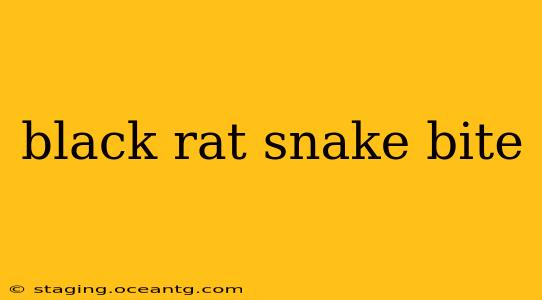The black rat snake ( Pantherophis obsoletus ) is a common, non-venomous snake found across much of North America. While often mistaken for venomous species like copperheads or cottonmouths, encountering a black rat snake poses little threat to humans. However, understanding their behavior and potential for defensive bites is crucial for responsible interaction. This article will address common concerns and misconceptions surrounding black rat snake bites.
Are Black Rat Snake Bites Dangerous?
No, black rat snake bites are not dangerous. They are not venomous, meaning they lack the specialized fangs and venom glands to inject toxins into their prey. Their bites, while potentially painful due to their size and strong jaws, are comparable to a dog bite – they can break the skin and cause localized swelling and bleeding, but they pose no systemic threat. Infection is the primary concern, and proper cleaning and wound care are essential.
What to Do if Bitten by a Black Rat Snake?
While a black rat snake bite is not venomous, it's still important to take appropriate steps:
- Clean the wound thoroughly: Wash the bite area with soap and water for at least 5 minutes. Use an antiseptic if available.
- Control bleeding: Apply gentle pressure with a clean cloth. Elevation of the bitten area can also help.
- Monitor for infection: Watch for signs of infection, such as increased redness, swelling, pus, or fever. Seek medical attention if you notice any of these symptoms.
- Seek medical attention if necessary: Although not venomous, deep puncture wounds from any snake bite can increase the risk of infection. Consult a doctor if you have concerns, especially if the wound is deep or shows signs of infection. They may prescribe antibiotics as a preventative measure.
How to Identify a Black Rat Snake Bite?
Identifying a black rat snake bite is generally straightforward. There will be puncture wounds from the snake's teeth, and the snake itself lacks the characteristics of venomous snakes. There will be no venom injected into the wound, and the symptoms will be limited to localized pain, swelling, and potentially some minor bleeding. This is in contrast to venomous snakebites, which often present with much more severe and systemic symptoms.
What are the Symptoms of a Black Rat Snake Bite?
The symptoms of a black rat snake bite are generally mild and limited to the bite area. You might experience:
- Pain: The pain can range from mild to moderate, depending on the size of the snake and the force of the bite.
- Swelling: Some swelling around the bite site is common.
- Bleeding: Minor bleeding may occur.
- Bruising: Bruising may develop near the bite area.
Do Black Rat Snakes Bite Often?
Black rat snakes are generally not aggressive and will only bite if they feel threatened or cornered. They prefer to flee from humans rather than engage in conflict. Most bites occur when people try to handle or capture the snake. Respect their space, and you're unlikely to be bitten.
How to Avoid Black Rat Snake Bites?
Avoiding black rat snake bites is largely about respecting the snake's space and avoiding situations that might provoke a defensive bite:
- Be aware of your surroundings: When hiking or spending time outdoors in areas where black rat snakes are known to inhabit, be cautious and watch where you step.
- Avoid handling snakes: Never try to handle a wild snake, even if it appears non-venomous.
- Secure your property: Keep your yard clean and free of debris, which can provide habitat for snakes. Seal any gaps or holes in your home's foundation.
By understanding the characteristics of a black rat snake bite and taking appropriate preventative measures, you can minimize your risk of an encounter and ensure a safe interaction with this beneficial reptile. Remember, black rat snakes are important parts of the ecosystem and play a vital role in pest control.
